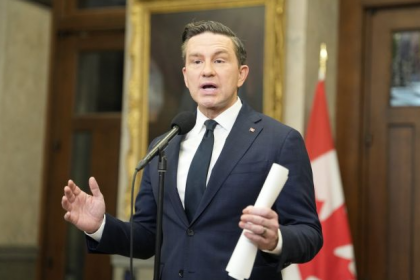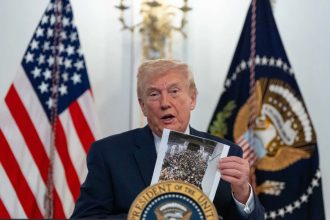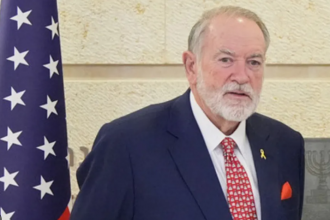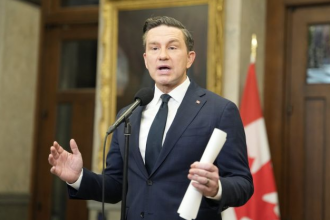September 21, 2025, Ottawa: Canada became the first G7 nation to recognize a Palestinian state, with Prime Minister Mark Carney saying on Sunday the country “offers our partnership in building the promise of a peaceful future”.
Prime Minister Mark Carney’s office says Canada will ‘intensify efforts’ to support the Palestinian Authority’s implementations of reforms a condition for the Canadian government recognizing the state of Palestine.
Canada now officially recognizes the state of Palestine and is doing so with international partners to preserve the prospect of a two-state solution, according to a statement from Prime Minister Mark Carney’s office released Sunday morning.
“Over many decades, Canada’s commitment to [a two-state solution] was premised on the expectation that this outcome would eventually be achieved as part of a negotiated settlement,” the Prime Minister’s Office (PMO) said.
However, that possibility “has been steadily and gravely eroded” by several developments, including the Oct. 7, 2023, Hamas-led attack on Israel, the Israeli parliament’s resolution supporting annexation of the occupied West Bank and the Israeli government’s restrictions on humanitarian aid.
“Hamas has terrorized the people of Israel and oppressed the people of Gaza, wreaking horrific suffering,” the PMO statement said. “Hamas has stolen from the Palestinian people, cheated them of their life and liberty and can in no way dictate their future.”
Prime Minister Mark Carney says Canada’s decision to recognize the state of Palestine was influenced by the possibility of a two-state solution being ‘eroded before our eyes.’
In addition, “the current Israeli government is working methodically to prevent the prospect of a Palestinian state from ever being established. It is now the avowed policy of the current Israeli government that there will be no Palestinian state.”
The PMO added that Canada offers its partnership in “building the promise of a peaceful future for both the State of Palestine and the State of Israel.”
As Canada recognizes a Palestinian state, some in the West Bank fear it’s too late. The announcement comes as Carney prepares to meet with world leaders in New York during the United Nations General Assembly.
Australia, the United Kingdom and Portugal also announced on Sunday they are recognizing the state of Palestine.
In a video statement posted to social media, British Prime Minister Keir Starmer said his government is “acting to keep alive the possibility of peace and a two-state solution,” adding, “That means a safe and secure Israel, alongside a viable Palestinian state. At the moment, we have neither.”
French President Emmanuel Macron told Margaret Brennan, host of CBS News’ Face the Nation, that his country would formally announce recognition on Monday.
Carney first announced Canada’s move in July and said recognition was conditional on the Palestinian Authority, which controls parts of the West Bank, making certain commitments.
Those commitments include governance reforms, general elections in 2026 in which Hamas can play no part and the demilitarization of the Palestinian state.
The PMO said that “Canada will intensify efforts to support the Palestinian Authority’s implementation of this reform agenda, on which progress has already been made.”
In a statement, Conservative Leader Pierre Poilievre said recognition is “another effort [by Carney] to distract from his record of rampant crime, costs, debt, immigration and job-loss.”
“Conservatives will always stand for Israel’s right to exist and defend itself, living next to a future demilitarized, terror-free, democratic and peaceful Palestinian state. Conservatives will focus on what is good for Canada because it is time to put our country first for a change,” he said.
Incoming UN ambassador David Lametti, speaking to CBC Radio’s The House host Catherine Cullen, says Canada will wait for a UN resolution or ICJ decision before taking a position on whether Israel’s military activity in Gaza constitutes genocide.
Hamas said in a statement that the recognition of a Palestinian state by Canada, as well as by the U.K. and Australia, is an “important step in maintaining the right of our Palestinian people to their land and holy sites, and to establishing their independent state with Jerusalem as its capital.”
“This important step must be accompanied by practical measures leading to an immediate halt to the brutal genocide against our Palestinian people in the Gaza Strip, and to confront the annexation and Judaization plans in the West Bank and Jerusalem,” it added.
‘A necessary moment,’ says Canada’s UN ambassador
In an interview on Rosemary Barton Live that aired Sunday morning, Canada’s ambassador to the UN, Bob Rae, said the federal government “has decided that it’s a necessary moment” and recognition is not an “impulsive decision” by Canada.
“I think it’s important for us to make it clear — including, frankly, the government of Israel — that we do not think that annexation of any other possible political path is a route that’s sustainable or in the best interests of Israel or anybody else,” Rae told host Rosemary Barton.
The Israeli Embassy in Canada said that it’s “deeply disappointed by Canada’s decision to acknowledge a Palestinian state in the current context,” which, it added, does not bring home hostages, free Palestinians from Hamas nor guarantee a peaceful future for Israelis and Palestinians.
Recognizing Palestinian state a ‘necessary moment’ for peace: Canada’s UN ambassador
Chief political correspondent Rosemary Barton speaks with Bob Rae, Canada’s ambassador to the United Nations, about the Canadian government’s decision to formally recognize the state of Palestine and what that means for stability in the region.
“It only rewards Hamas and its sympathizers,” the embassy said. “We compel the Government of Canada to reverse this decision and support a future agreement developed through direct negotiations and mutual recognition.”
Avi Abraham Benlolo, CEO of the Abraham Global Peace Initiative in Toronto, told CBC News his organization is “shocked that it just happened this quickly” and that Carney is moving ahead with recognition despite the Palestinian Authority not meeting the conditions laid out by Canada. “He’s basically reneged on his own words and promise to Canadians,” he said, adding that the Jewish community “is feeling both very angry, very upset and also very fearful of what the future holds here in Canada.” Benlolo also said the Palestinian Authority “has no control over Gaza, and Gaza is still at war.”
When asked how some could see Canada’s recognition of the state of Palestine as offensive, Rae said, “Of course we understand people’s feelings. I think it’s also important for people to understand the need to think consequentially because there’s no point in thinking impulsively about this.” “We all recognize the existence of feelings, but it’s important for us to recognize the reality that two states is the best steps to security, both for Israel and for the people of Palestine.”
On Friday, a group of U.S. Republicans wrote a letter to Carney, Starmer, Macron and Australian Prime Minister Anthony Albanese calling recognition a “reckless policy that undermines prospects for peace.”
The Republicans also argued that recognition sets a precedent “that violence, not diplomacy, is the most expedient means for terrorist groups like Hamas to achieve their political aims.”
Rae said he disagrees “most emphatically with that view” and that Canada’s approach is not meant to embolden Hamas. “This is not intended in any way, shape or form to change Canada’s support for the existence and the security of the state of Israel,” he said.
The PMO’s statement said Canada’s recognition “in no way legitimizes terrorism, nor is it any reward for it.”
The Hamas-led attack on southern Israel almost two years ago killed 1,200 people, including several Canadian citizens, and resulted in 251 people being taken hostage, according to Israeli figures.
Israel’s military response in Gaza has killed more than 64,000 people, according to the Gaza Health Ministry, while a global hunger monitor backed by the United Nations says Palestinians in parts of the enclave are suffering from famine.
James Kafieh, a lawyer and vice-president of the Palestinian Canadian Congress, said the recognition is “wonderful, although it is 30 years overdue. But I think that it’s a marvellous progression, even if it happens under the impetus of a genocide in Gaza.”
He added, “There is not much Palestine left that the Israelis have not already effectively annexed, but this may mark the turn in Palestinian history that will finally allow Palestinians to realize statehood.”
UN inquiry finds that Israel has committed genocide in Gaza
Canada has not called the crisis in Gaza a genocide. Incoming UN ambassador David Lametti, a former Liberal justice minister, told CBC’s The House this week that the government “needs all the evidence to come in” and be assessed before it makes that determination.
Lametti also said Canada’s determination usually follows the lead of a UN resolution or a ruling from the International Court of Justice.
UN inquiry finds Israel is committing genocide in Gaza:
A United Nations Commission of Inquiry in Geneva concluded on Tuesday that Israel has committed genocide in Gaza and that top Israeli officials, including Prime Minister Benjamin Netanyahu, had incited these acts — accusations that Israel called scandalous.
On the same day a ground offensive was launched in Gaza City, a United Nations Commission of Inquiry report concluded Israel has committed genocide in Gaza, a finding emphatically denied by Israeli officials.
Now that Canada recognizes the state of Palestine, Kafieh said, the next question is how the Canadian government will protect the area. He called on Ottawa to impose sanctions against the state of Israel, not just Israeli officials, as Canada has done in the past.
Stephen Brown, CEO of the National Council of Canadian Muslims, said Canada’s recognition is a “historical day,” but it comes with “bittersweet reaction” because Palestinians are facing “extremely difficult situations, especially when it comes to starvation.”
“At the end of the day, what matters here is this is a very difficult situation and the world needs to use every last tool in its toolbox. Recognition of sovereignty is one such tool,” Brown said. “Ensuring security is another tool.”







